Organisational Behaviour Report: BBC - Culture, Power, and Teams
VerifiedAdded on 2020/12/09
|17
|4608
|132
Report
AI Summary
This report provides an analysis of organisational behaviour within the British Broadcasting Corporation (BBC). It explores various aspects including organisational culture, power dynamics, and political behaviour, examining their influence on employee conduct and performance. The report delves into Handy's typology of organisational culture, discussing power, role, task, and person cultures, and suggests the most appropriate culture for BBC. It also examines the impact of power, including legitimate, expert, referent, coercive, and reward power, on employee motivation. Furthermore, the report analyses content and process theories of motivation, focusing on Maslow's hierarchy of needs and equity theory, to improve employee performance. It also discusses different types of teams within an organisation, such as functional, problem-solving, project, and virtual teams, as well as the importance of effective team roles based on Belbin's Team Role model. The report concludes by highlighting the barriers to effective team performance and suggesting strategies to improve team productivity and overall organisational success.

Organisational
behaviour
behaviour
Paraphrase This Document
Need a fresh take? Get an instant paraphrase of this document with our AI Paraphraser

Contents
INTRODUCTION...........................................................................................................................1
TASK 1............................................................................................................................................1
Organisational culture, power and political behaviour affect behaviour of staff........................1
Organisational Culture...............................................................................................................1
TASK 2............................................................................................................................................3
Content and Process Theories of Motivation.............................................................................3
TASK 3............................................................................................................................................6
Different type of teams in organisation.......................................................................................6
Types of Teams................................................................................................................................6
Effective Team.................................................................................................................................6
TASK 4............................................................................................................................................8
Team Performance And Productivity..............................................................................................8
Main Barriers to Effective Performance........................................................................................10
CONCLUSION..............................................................................................................................11
REFERENCES..............................................................................................................................12
INTRODUCTION...........................................................................................................................1
TASK 1............................................................................................................................................1
Organisational culture, power and political behaviour affect behaviour of staff........................1
Organisational Culture...............................................................................................................1
TASK 2............................................................................................................................................3
Content and Process Theories of Motivation.............................................................................3
TASK 3............................................................................................................................................6
Different type of teams in organisation.......................................................................................6
Types of Teams................................................................................................................................6
Effective Team.................................................................................................................................6
TASK 4............................................................................................................................................8
Team Performance And Productivity..............................................................................................8
Main Barriers to Effective Performance........................................................................................10
CONCLUSION..............................................................................................................................11
REFERENCES..............................................................................................................................12

⊘ This is a preview!⊘
Do you want full access?
Subscribe today to unlock all pages.

Trusted by 1+ million students worldwide
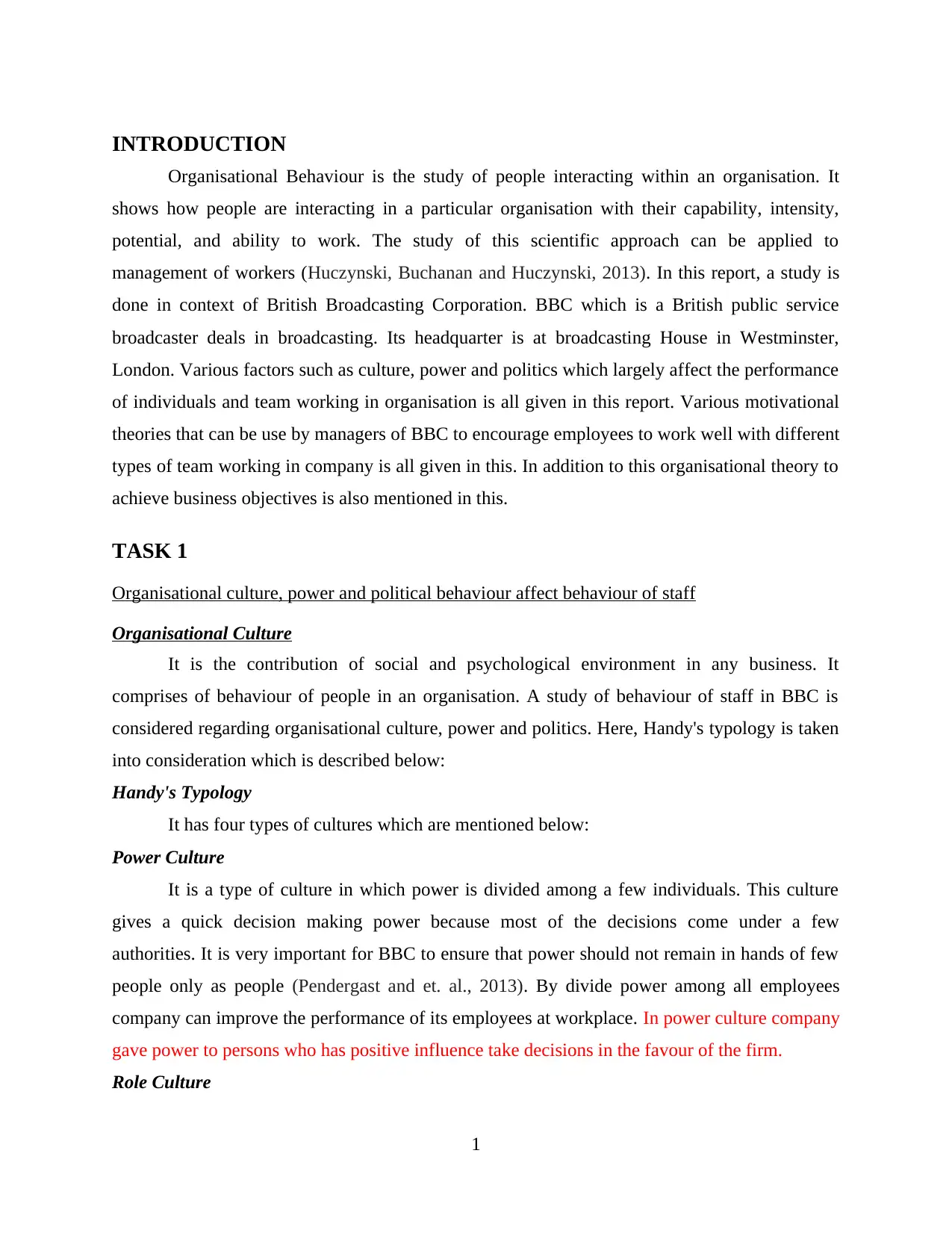
INTRODUCTION
Organisational Behaviour is the study of people interacting within an organisation. It
shows how people are interacting in a particular organisation with their capability, intensity,
potential, and ability to work. The study of this scientific approach can be applied to
management of workers (Huczynski, Buchanan and Huczynski, 2013). In this report, a study is
done in context of British Broadcasting Corporation. BBC which is a British public service
broadcaster deals in broadcasting. Its headquarter is at broadcasting House in Westminster,
London. Various factors such as culture, power and politics which largely affect the performance
of individuals and team working in organisation is all given in this report. Various motivational
theories that can be use by managers of BBC to encourage employees to work well with different
types of team working in company is all given in this. In addition to this organisational theory to
achieve business objectives is also mentioned in this.
TASK 1
Organisational culture, power and political behaviour affect behaviour of staff
Organisational Culture
It is the contribution of social and psychological environment in any business. It
comprises of behaviour of people in an organisation. A study of behaviour of staff in BBC is
considered regarding organisational culture, power and politics. Here, Handy's typology is taken
into consideration which is described below:
Handy's Typology
It has four types of cultures which are mentioned below:
Power Culture
It is a type of culture in which power is divided among a few individuals. This culture
gives a quick decision making power because most of the decisions come under a few
authorities. It is very important for BBC to ensure that power should not remain in hands of few
people only as people (Pendergast and et. al., 2013). By divide power among all employees
company can improve the performance of its employees at workplace. In power culture company
gave power to persons who has positive influence take decisions in the favour of the firm.
Role Culture
1
Organisational Behaviour is the study of people interacting within an organisation. It
shows how people are interacting in a particular organisation with their capability, intensity,
potential, and ability to work. The study of this scientific approach can be applied to
management of workers (Huczynski, Buchanan and Huczynski, 2013). In this report, a study is
done in context of British Broadcasting Corporation. BBC which is a British public service
broadcaster deals in broadcasting. Its headquarter is at broadcasting House in Westminster,
London. Various factors such as culture, power and politics which largely affect the performance
of individuals and team working in organisation is all given in this report. Various motivational
theories that can be use by managers of BBC to encourage employees to work well with different
types of team working in company is all given in this. In addition to this organisational theory to
achieve business objectives is also mentioned in this.
TASK 1
Organisational culture, power and political behaviour affect behaviour of staff
Organisational Culture
It is the contribution of social and psychological environment in any business. It
comprises of behaviour of people in an organisation. A study of behaviour of staff in BBC is
considered regarding organisational culture, power and politics. Here, Handy's typology is taken
into consideration which is described below:
Handy's Typology
It has four types of cultures which are mentioned below:
Power Culture
It is a type of culture in which power is divided among a few individuals. This culture
gives a quick decision making power because most of the decisions come under a few
authorities. It is very important for BBC to ensure that power should not remain in hands of few
people only as people (Pendergast and et. al., 2013). By divide power among all employees
company can improve the performance of its employees at workplace. In power culture company
gave power to persons who has positive influence take decisions in the favour of the firm.
Role Culture
1
Paraphrase This Document
Need a fresh take? Get an instant paraphrase of this document with our AI Paraphraser
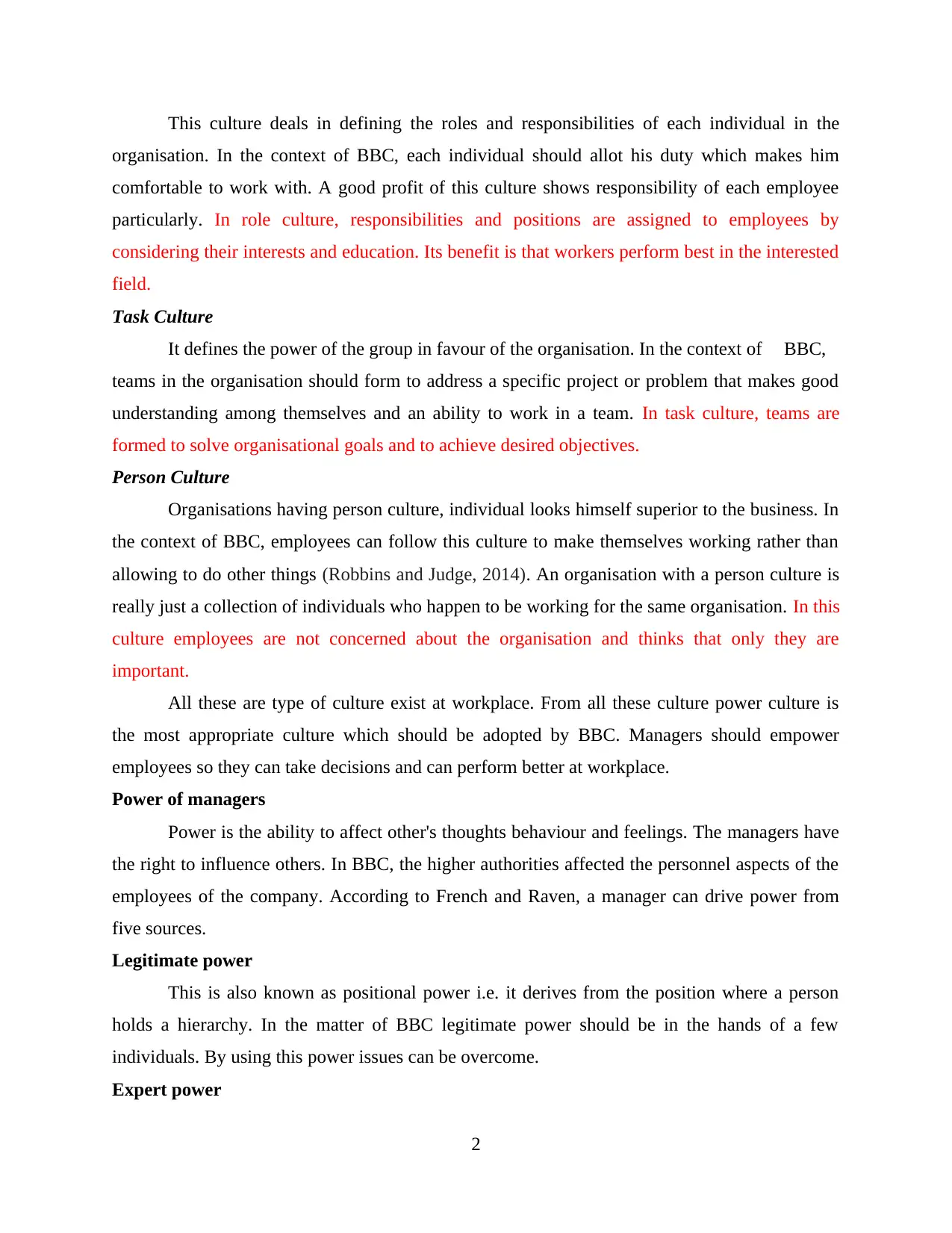
This culture deals in defining the roles and responsibilities of each individual in the
organisation. In the context of BBC, each individual should allot his duty which makes him
comfortable to work with. A good profit of this culture shows responsibility of each employee
particularly. In role culture, responsibilities and positions are assigned to employees by
considering their interests and education. Its benefit is that workers perform best in the interested
field.
Task Culture
It defines the power of the group in favour of the organisation. In the context of BBC,
teams in the organisation should form to address a specific project or problem that makes good
understanding among themselves and an ability to work in a team. In task culture, teams are
formed to solve organisational goals and to achieve desired objectives.
Person Culture
Organisations having person culture, individual looks himself superior to the business. In
the context of BBC, employees can follow this culture to make themselves working rather than
allowing to do other things (Robbins and Judge, 2014). An organisation with a person culture is
really just a collection of individuals who happen to be working for the same organisation. In this
culture employees are not concerned about the organisation and thinks that only they are
important.
All these are type of culture exist at workplace. From all these culture power culture is
the most appropriate culture which should be adopted by BBC. Managers should empower
employees so they can take decisions and can perform better at workplace.
Power of managers
Power is the ability to affect other's thoughts behaviour and feelings. The managers have
the right to influence others. In BBC, the higher authorities affected the personnel aspects of the
employees of the company. According to French and Raven, a manager can drive power from
five sources.
Legitimate power
This is also known as positional power i.e. it derives from the position where a person
holds a hierarchy. In the matter of BBC legitimate power should be in the hands of a few
individuals. By using this power issues can be overcome.
Expert power
2
organisation. In the context of BBC, each individual should allot his duty which makes him
comfortable to work with. A good profit of this culture shows responsibility of each employee
particularly. In role culture, responsibilities and positions are assigned to employees by
considering their interests and education. Its benefit is that workers perform best in the interested
field.
Task Culture
It defines the power of the group in favour of the organisation. In the context of BBC,
teams in the organisation should form to address a specific project or problem that makes good
understanding among themselves and an ability to work in a team. In task culture, teams are
formed to solve organisational goals and to achieve desired objectives.
Person Culture
Organisations having person culture, individual looks himself superior to the business. In
the context of BBC, employees can follow this culture to make themselves working rather than
allowing to do other things (Robbins and Judge, 2014). An organisation with a person culture is
really just a collection of individuals who happen to be working for the same organisation. In this
culture employees are not concerned about the organisation and thinks that only they are
important.
All these are type of culture exist at workplace. From all these culture power culture is
the most appropriate culture which should be adopted by BBC. Managers should empower
employees so they can take decisions and can perform better at workplace.
Power of managers
Power is the ability to affect other's thoughts behaviour and feelings. The managers have
the right to influence others. In BBC, the higher authorities affected the personnel aspects of the
employees of the company. According to French and Raven, a manager can drive power from
five sources.
Legitimate power
This is also known as positional power i.e. it derives from the position where a person
holds a hierarchy. In the matter of BBC legitimate power should be in the hands of a few
individuals. By using this power issues can be overcome.
Expert power
2
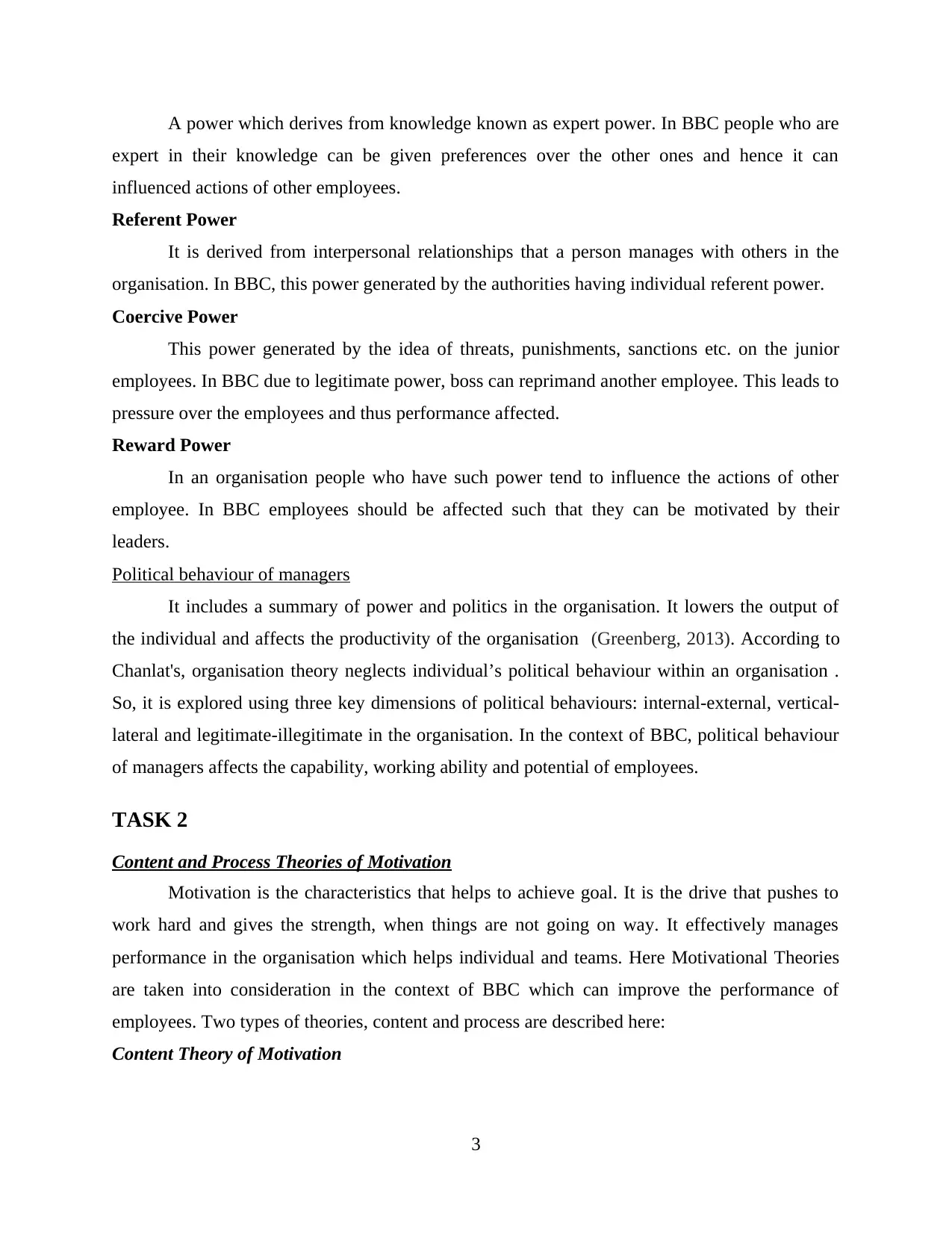
A power which derives from knowledge known as expert power. In BBC people who are
expert in their knowledge can be given preferences over the other ones and hence it can
influenced actions of other employees.
Referent Power
It is derived from interpersonal relationships that a person manages with others in the
organisation. In BBC, this power generated by the authorities having individual referent power.
Coercive Power
This power generated by the idea of threats, punishments, sanctions etc. on the junior
employees. In BBC due to legitimate power, boss can reprimand another employee. This leads to
pressure over the employees and thus performance affected.
Reward Power
In an organisation people who have such power tend to influence the actions of other
employee. In BBC employees should be affected such that they can be motivated by their
leaders.
Political behaviour of managers
It includes a summary of power and politics in the organisation. It lowers the output of
the individual and affects the productivity of the organisation (Greenberg, 2013). According to
Chanlat's, organisation theory neglects individual’s political behaviour within an organisation .
So, it is explored using three key dimensions of political behaviours: internal-external, vertical-
lateral and legitimate-illegitimate in the organisation. In the context of BBC, political behaviour
of managers affects the capability, working ability and potential of employees.
TASK 2
Content and Process Theories of Motivation
Motivation is the characteristics that helps to achieve goal. It is the drive that pushes to
work hard and gives the strength, when things are not going on way. It effectively manages
performance in the organisation which helps individual and teams. Here Motivational Theories
are taken into consideration in the context of BBC which can improve the performance of
employees. Two types of theories, content and process are described here:
Content Theory of Motivation
3
expert in their knowledge can be given preferences over the other ones and hence it can
influenced actions of other employees.
Referent Power
It is derived from interpersonal relationships that a person manages with others in the
organisation. In BBC, this power generated by the authorities having individual referent power.
Coercive Power
This power generated by the idea of threats, punishments, sanctions etc. on the junior
employees. In BBC due to legitimate power, boss can reprimand another employee. This leads to
pressure over the employees and thus performance affected.
Reward Power
In an organisation people who have such power tend to influence the actions of other
employee. In BBC employees should be affected such that they can be motivated by their
leaders.
Political behaviour of managers
It includes a summary of power and politics in the organisation. It lowers the output of
the individual and affects the productivity of the organisation (Greenberg, 2013). According to
Chanlat's, organisation theory neglects individual’s political behaviour within an organisation .
So, it is explored using three key dimensions of political behaviours: internal-external, vertical-
lateral and legitimate-illegitimate in the organisation. In the context of BBC, political behaviour
of managers affects the capability, working ability and potential of employees.
TASK 2
Content and Process Theories of Motivation
Motivation is the characteristics that helps to achieve goal. It is the drive that pushes to
work hard and gives the strength, when things are not going on way. It effectively manages
performance in the organisation which helps individual and teams. Here Motivational Theories
are taken into consideration in the context of BBC which can improve the performance of
employees. Two types of theories, content and process are described here:
Content Theory of Motivation
3
⊘ This is a preview!⊘
Do you want full access?
Subscribe today to unlock all pages.

Trusted by 1+ million students worldwide

It describes as what is required for motivation. Here Maslow's hierarchy of needs is taken
into consideration. This theory shows the needs from lower to higher. As lower needs are
fulfilled there is a tendency of higher needs to emerge. This theory is divided into five parts as:
Figure 1: Maslow’s hierarchy of needs, 2018
Source: Maslow’s hierarchy of needs, 2018
Physiological needs
This is the basic need that an employee requires. It can help an employee working in
BBC to motivate himself because physiological needs give the basic which is required for. It
helps in achieving concentration and will provide a positive feedback to the employee regarding
company.
Safety and Security
After satisfaction of basic needs of individual this need of individual arise. Personnel
security, financial security, health security and safely mesh against accidents, illness and their
adverse impact are included in such need. BBC employees should get these facilities so that they
can satisfy their need.
Social Needs
People need to love and be loved by others. This type of need is related to social
requirements. Need of international relationship affects decisions and behaviour of employees.
Receiving love, friendship and feeling of belongingness is all come under this. To satisfy this
need of workers managers should encourage development and working of team at workplace.
4
into consideration. This theory shows the needs from lower to higher. As lower needs are
fulfilled there is a tendency of higher needs to emerge. This theory is divided into five parts as:
Figure 1: Maslow’s hierarchy of needs, 2018
Source: Maslow’s hierarchy of needs, 2018
Physiological needs
This is the basic need that an employee requires. It can help an employee working in
BBC to motivate himself because physiological needs give the basic which is required for. It
helps in achieving concentration and will provide a positive feedback to the employee regarding
company.
Safety and Security
After satisfaction of basic needs of individual this need of individual arise. Personnel
security, financial security, health security and safely mesh against accidents, illness and their
adverse impact are included in such need. BBC employees should get these facilities so that they
can satisfy their need.
Social Needs
People need to love and be loved by others. This type of need is related to social
requirements. Need of international relationship affects decisions and behaviour of employees.
Receiving love, friendship and feeling of belongingness is all come under this. To satisfy this
need of workers managers should encourage development and working of team at workplace.
4
Paraphrase This Document
Need a fresh take? Get an instant paraphrase of this document with our AI Paraphraser
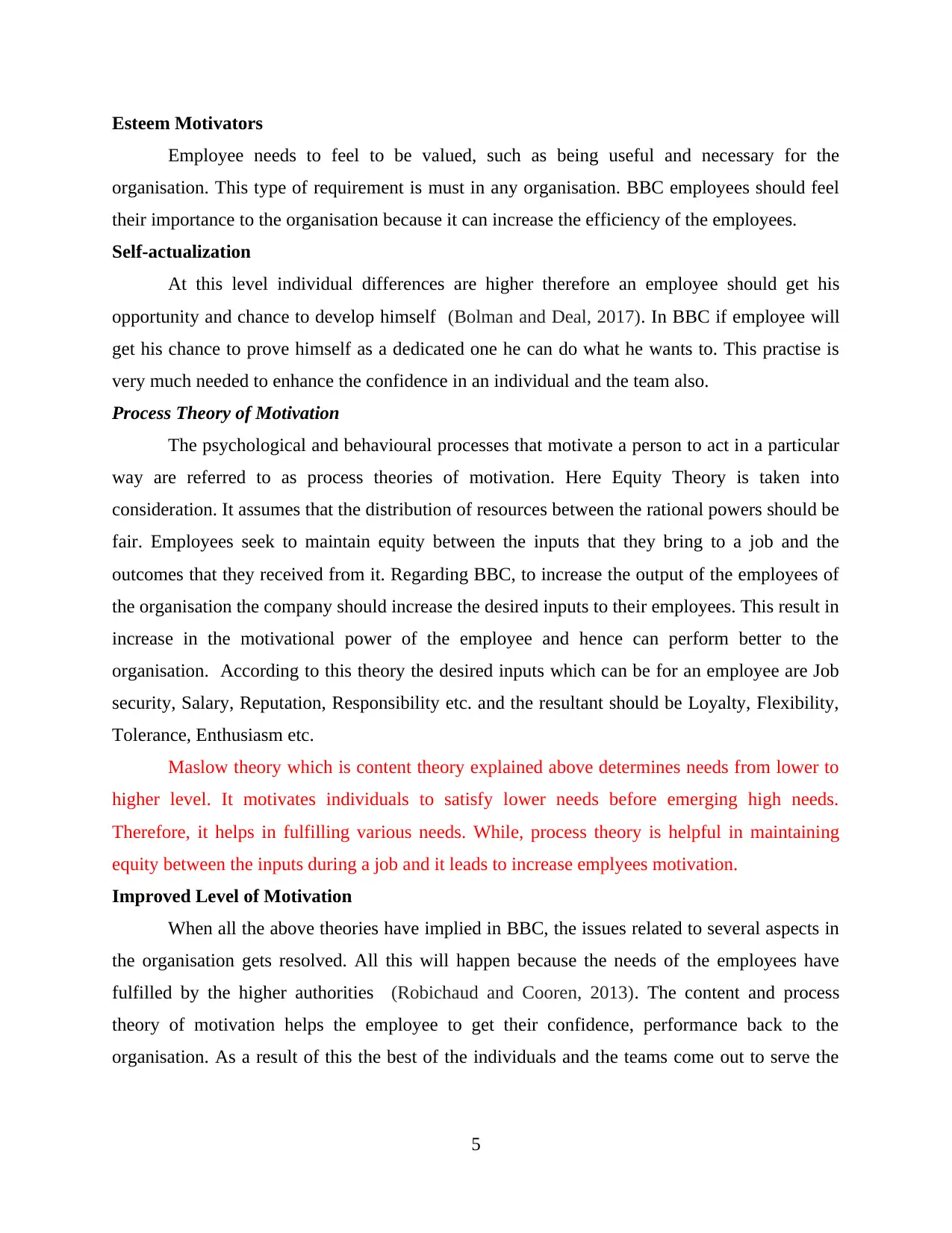
Esteem Motivators
Employee needs to feel to be valued, such as being useful and necessary for the
organisation. This type of requirement is must in any organisation. BBC employees should feel
their importance to the organisation because it can increase the efficiency of the employees.
Self-actualization
At this level individual differences are higher therefore an employee should get his
opportunity and chance to develop himself (Bolman and Deal, 2017). In BBC if employee will
get his chance to prove himself as a dedicated one he can do what he wants to. This practise is
very much needed to enhance the confidence in an individual and the team also.
Process Theory of Motivation
The psychological and behavioural processes that motivate a person to act in a particular
way are referred to as process theories of motivation. Here Equity Theory is taken into
consideration. It assumes that the distribution of resources between the rational powers should be
fair. Employees seek to maintain equity between the inputs that they bring to a job and the
outcomes that they received from it. Regarding BBC, to increase the output of the employees of
the organisation the company should increase the desired inputs to their employees. This result in
increase in the motivational power of the employee and hence can perform better to the
organisation. According to this theory the desired inputs which can be for an employee are Job
security, Salary, Reputation, Responsibility etc. and the resultant should be Loyalty, Flexibility,
Tolerance, Enthusiasm etc.
Maslow theory which is content theory explained above determines needs from lower to
higher level. It motivates individuals to satisfy lower needs before emerging high needs.
Therefore, it helps in fulfilling various needs. While, process theory is helpful in maintaining
equity between the inputs during a job and it leads to increase emplyees motivation.
Improved Level of Motivation
When all the above theories have implied in BBC, the issues related to several aspects in
the organisation gets resolved. All this will happen because the needs of the employees have
fulfilled by the higher authorities (Robichaud and Cooren, 2013). The content and process
theory of motivation helps the employee to get their confidence, performance back to the
organisation. As a result of this the best of the individuals and the teams come out to serve the
5
Employee needs to feel to be valued, such as being useful and necessary for the
organisation. This type of requirement is must in any organisation. BBC employees should feel
their importance to the organisation because it can increase the efficiency of the employees.
Self-actualization
At this level individual differences are higher therefore an employee should get his
opportunity and chance to develop himself (Bolman and Deal, 2017). In BBC if employee will
get his chance to prove himself as a dedicated one he can do what he wants to. This practise is
very much needed to enhance the confidence in an individual and the team also.
Process Theory of Motivation
The psychological and behavioural processes that motivate a person to act in a particular
way are referred to as process theories of motivation. Here Equity Theory is taken into
consideration. It assumes that the distribution of resources between the rational powers should be
fair. Employees seek to maintain equity between the inputs that they bring to a job and the
outcomes that they received from it. Regarding BBC, to increase the output of the employees of
the organisation the company should increase the desired inputs to their employees. This result in
increase in the motivational power of the employee and hence can perform better to the
organisation. According to this theory the desired inputs which can be for an employee are Job
security, Salary, Reputation, Responsibility etc. and the resultant should be Loyalty, Flexibility,
Tolerance, Enthusiasm etc.
Maslow theory which is content theory explained above determines needs from lower to
higher level. It motivates individuals to satisfy lower needs before emerging high needs.
Therefore, it helps in fulfilling various needs. While, process theory is helpful in maintaining
equity between the inputs during a job and it leads to increase emplyees motivation.
Improved Level of Motivation
When all the above theories have implied in BBC, the issues related to several aspects in
the organisation gets resolved. All this will happen because the needs of the employees have
fulfilled by the higher authorities (Robichaud and Cooren, 2013). The content and process
theory of motivation helps the employee to get their confidence, performance back to the
organisation. As a result of this the best of the individuals and the teams come out to serve the
5
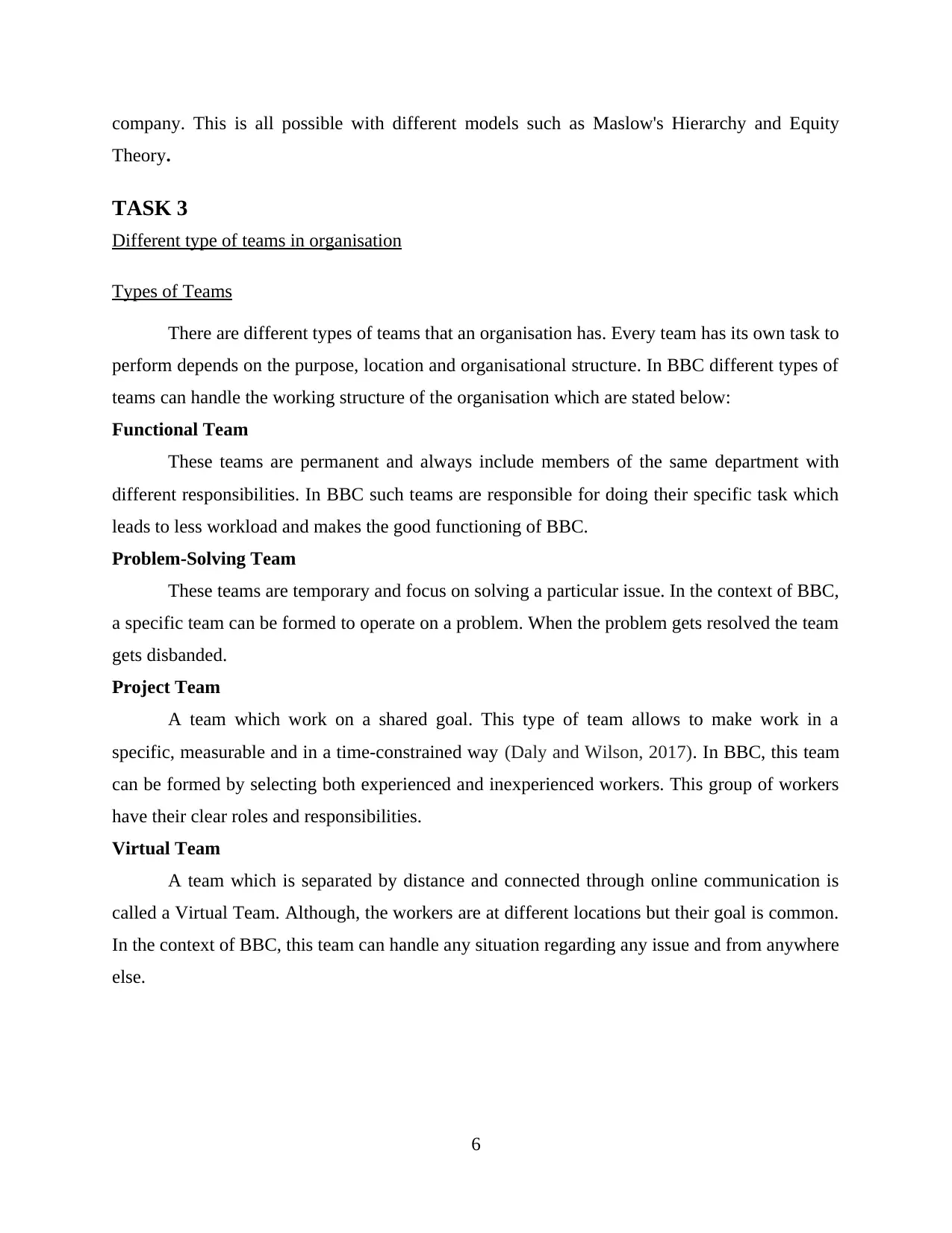
company. This is all possible with different models such as Maslow's Hierarchy and Equity
Theory.
TASK 3
Different type of teams in organisation
Types of Teams
There are different types of teams that an organisation has. Every team has its own task to
perform depends on the purpose, location and organisational structure. In BBC different types of
teams can handle the working structure of the organisation which are stated below:
Functional Team
These teams are permanent and always include members of the same department with
different responsibilities. In BBC such teams are responsible for doing their specific task which
leads to less workload and makes the good functioning of BBC.
Problem-Solving Team
These teams are temporary and focus on solving a particular issue. In the context of BBC,
a specific team can be formed to operate on a problem. When the problem gets resolved the team
gets disbanded.
Project Team
A team which work on a shared goal. This type of team allows to make work in a
specific, measurable and in a time-constrained way (Daly and Wilson, 2017). In BBC, this team
can be formed by selecting both experienced and inexperienced workers. This group of workers
have their clear roles and responsibilities.
Virtual Team
A team which is separated by distance and connected through online communication is
called a Virtual Team. Although, the workers are at different locations but their goal is common.
In the context of BBC, this team can handle any situation regarding any issue and from anywhere
else.
6
Theory.
TASK 3
Different type of teams in organisation
Types of Teams
There are different types of teams that an organisation has. Every team has its own task to
perform depends on the purpose, location and organisational structure. In BBC different types of
teams can handle the working structure of the organisation which are stated below:
Functional Team
These teams are permanent and always include members of the same department with
different responsibilities. In BBC such teams are responsible for doing their specific task which
leads to less workload and makes the good functioning of BBC.
Problem-Solving Team
These teams are temporary and focus on solving a particular issue. In the context of BBC,
a specific team can be formed to operate on a problem. When the problem gets resolved the team
gets disbanded.
Project Team
A team which work on a shared goal. This type of team allows to make work in a
specific, measurable and in a time-constrained way (Daly and Wilson, 2017). In BBC, this team
can be formed by selecting both experienced and inexperienced workers. This group of workers
have their clear roles and responsibilities.
Virtual Team
A team which is separated by distance and connected through online communication is
called a Virtual Team. Although, the workers are at different locations but their goal is common.
In the context of BBC, this team can handle any situation regarding any issue and from anywhere
else.
6
⊘ This is a preview!⊘
Do you want full access?
Subscribe today to unlock all pages.

Trusted by 1+ million students worldwide
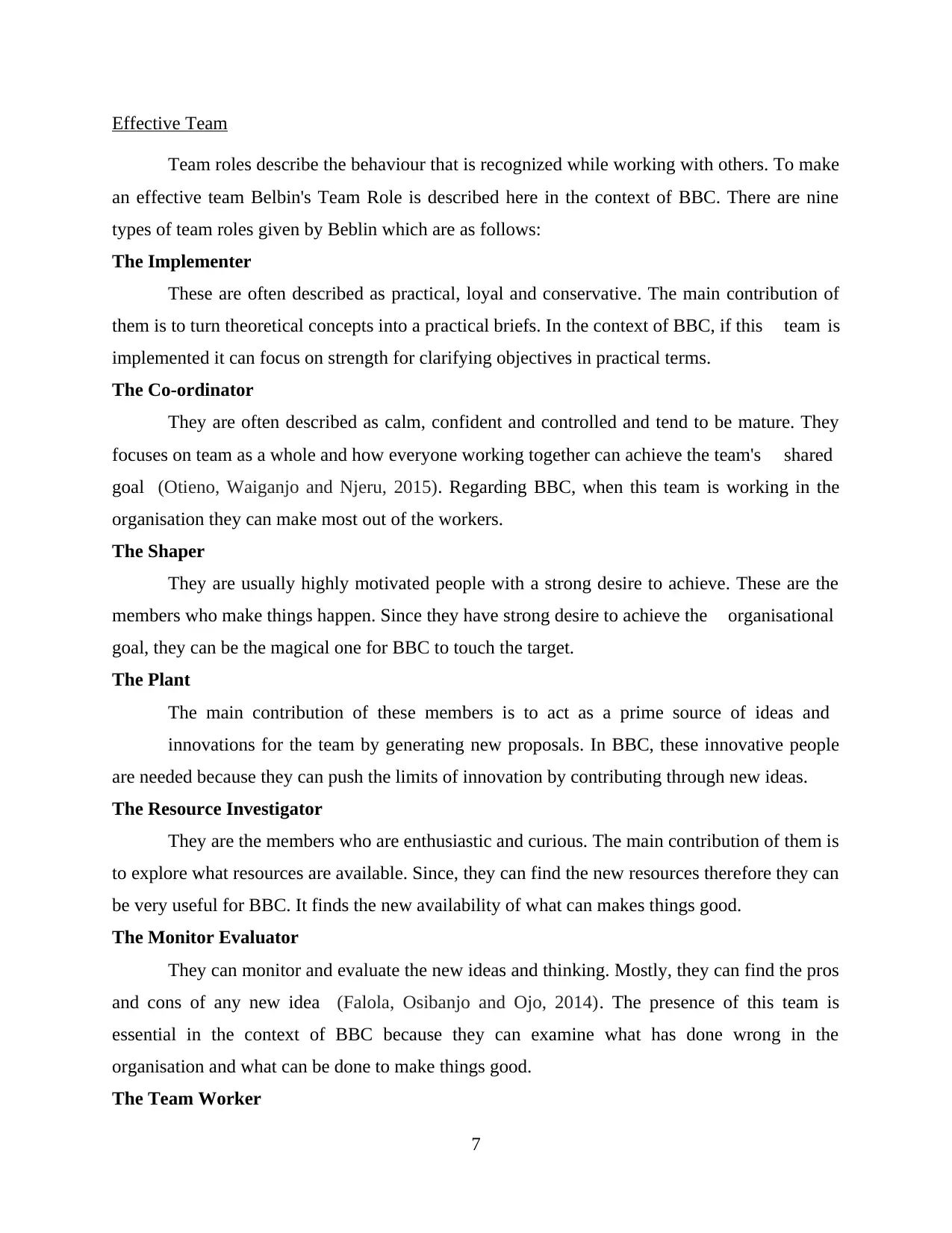
Effective Team
Team roles describe the behaviour that is recognized while working with others. To make
an effective team Belbin's Team Role is described here in the context of BBC. There are nine
types of team roles given by Beblin which are as follows:
The Implementer
These are often described as practical, loyal and conservative. The main contribution of
them is to turn theoretical concepts into a practical briefs. In the context of BBC, if this team is
implemented it can focus on strength for clarifying objectives in practical terms.
The Co-ordinator
They are often described as calm, confident and controlled and tend to be mature. They
focuses on team as a whole and how everyone working together can achieve the team's shared
goal (Otieno, Waiganjo and Njeru, 2015). Regarding BBC, when this team is working in the
organisation they can make most out of the workers.
The Shaper
They are usually highly motivated people with a strong desire to achieve. These are the
members who make things happen. Since they have strong desire to achieve the organisational
goal, they can be the magical one for BBC to touch the target.
The Plant
The main contribution of these members is to act as a prime source of ideas and
innovations for the team by generating new proposals. In BBC, these innovative people
are needed because they can push the limits of innovation by contributing through new ideas.
The Resource Investigator
They are the members who are enthusiastic and curious. The main contribution of them is
to explore what resources are available. Since, they can find the new resources therefore they can
be very useful for BBC. It finds the new availability of what can makes things good.
The Monitor Evaluator
They can monitor and evaluate the new ideas and thinking. Mostly, they can find the pros
and cons of any new idea (Falola, Osibanjo and Ojo, 2014). The presence of this team is
essential in the context of BBC because they can examine what has done wrong in the
organisation and what can be done to make things good.
The Team Worker
7
Team roles describe the behaviour that is recognized while working with others. To make
an effective team Belbin's Team Role is described here in the context of BBC. There are nine
types of team roles given by Beblin which are as follows:
The Implementer
These are often described as practical, loyal and conservative. The main contribution of
them is to turn theoretical concepts into a practical briefs. In the context of BBC, if this team is
implemented it can focus on strength for clarifying objectives in practical terms.
The Co-ordinator
They are often described as calm, confident and controlled and tend to be mature. They
focuses on team as a whole and how everyone working together can achieve the team's shared
goal (Otieno, Waiganjo and Njeru, 2015). Regarding BBC, when this team is working in the
organisation they can make most out of the workers.
The Shaper
They are usually highly motivated people with a strong desire to achieve. These are the
members who make things happen. Since they have strong desire to achieve the organisational
goal, they can be the magical one for BBC to touch the target.
The Plant
The main contribution of these members is to act as a prime source of ideas and
innovations for the team by generating new proposals. In BBC, these innovative people
are needed because they can push the limits of innovation by contributing through new ideas.
The Resource Investigator
They are the members who are enthusiastic and curious. The main contribution of them is
to explore what resources are available. Since, they can find the new resources therefore they can
be very useful for BBC. It finds the new availability of what can makes things good.
The Monitor Evaluator
They can monitor and evaluate the new ideas and thinking. Mostly, they can find the pros
and cons of any new idea (Falola, Osibanjo and Ojo, 2014). The presence of this team is
essential in the context of BBC because they can examine what has done wrong in the
organisation and what can be done to make things good.
The Team Worker
7
Paraphrase This Document
Need a fresh take? Get an instant paraphrase of this document with our AI Paraphraser
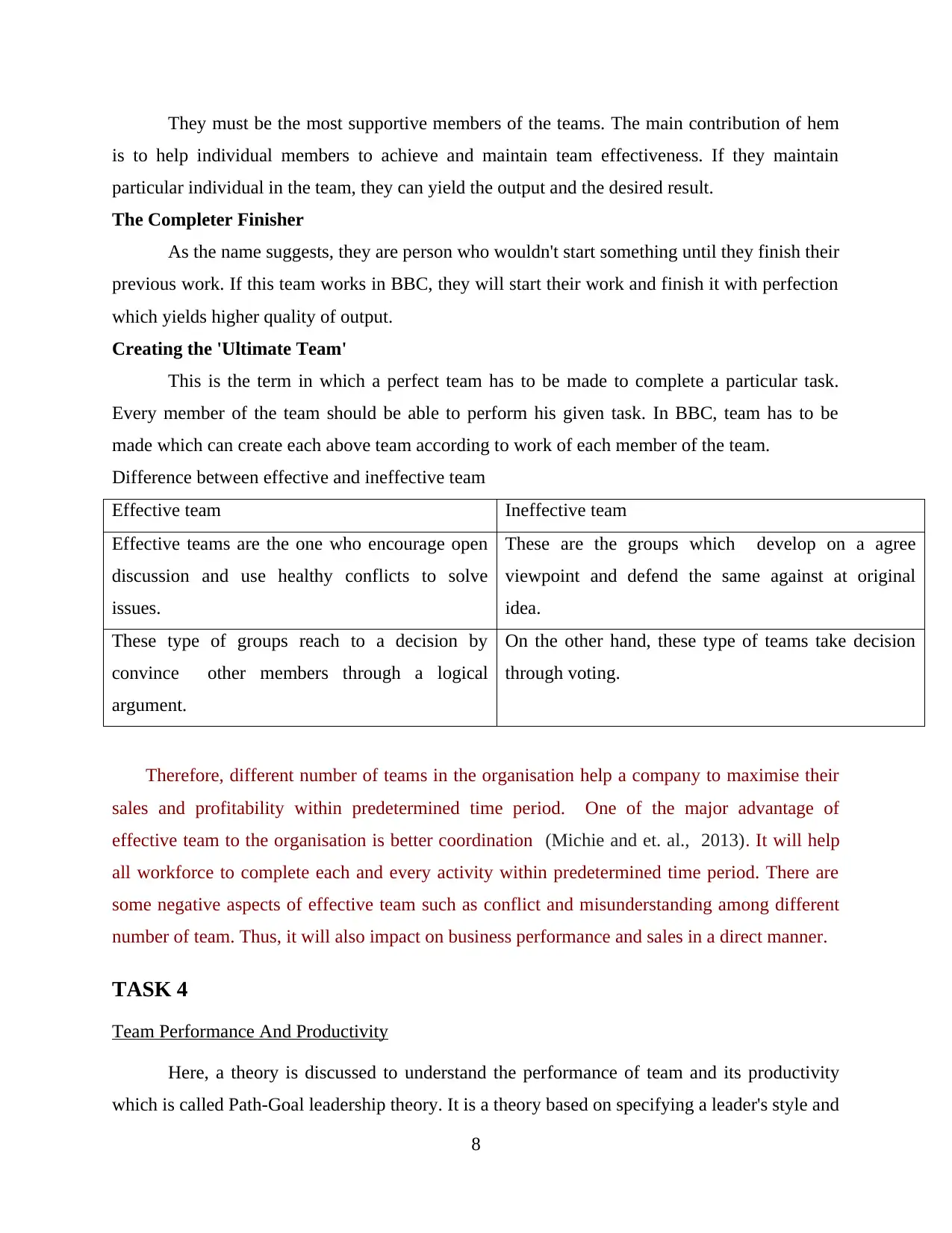
They must be the most supportive members of the teams. The main contribution of hem
is to help individual members to achieve and maintain team effectiveness. If they maintain
particular individual in the team, they can yield the output and the desired result.
The Completer Finisher
As the name suggests, they are person who wouldn't start something until they finish their
previous work. If this team works in BBC, they will start their work and finish it with perfection
which yields higher quality of output.
Creating the 'Ultimate Team'
This is the term in which a perfect team has to be made to complete a particular task.
Every member of the team should be able to perform his given task. In BBC, team has to be
made which can create each above team according to work of each member of the team.
Difference between effective and ineffective team
Effective team Ineffective team
Effective teams are the one who encourage open
discussion and use healthy conflicts to solve
issues.
These are the groups which develop on a agree
viewpoint and defend the same against at original
idea.
These type of groups reach to a decision by
convince other members through a logical
argument.
On the other hand, these type of teams take decision
through voting.
Therefore, different number of teams in the organisation help a company to maximise their
sales and profitability within predetermined time period. One of the major advantage of
effective team to the organisation is better coordination (Michie and et. al., 2013). It will help
all workforce to complete each and every activity within predetermined time period. There are
some negative aspects of effective team such as conflict and misunderstanding among different
number of team. Thus, it will also impact on business performance and sales in a direct manner.
TASK 4
Team Performance And Productivity
Here, a theory is discussed to understand the performance of team and its productivity
which is called Path-Goal leadership theory. It is a theory based on specifying a leader's style and
8
is to help individual members to achieve and maintain team effectiveness. If they maintain
particular individual in the team, they can yield the output and the desired result.
The Completer Finisher
As the name suggests, they are person who wouldn't start something until they finish their
previous work. If this team works in BBC, they will start their work and finish it with perfection
which yields higher quality of output.
Creating the 'Ultimate Team'
This is the term in which a perfect team has to be made to complete a particular task.
Every member of the team should be able to perform his given task. In BBC, team has to be
made which can create each above team according to work of each member of the team.
Difference between effective and ineffective team
Effective team Ineffective team
Effective teams are the one who encourage open
discussion and use healthy conflicts to solve
issues.
These are the groups which develop on a agree
viewpoint and defend the same against at original
idea.
These type of groups reach to a decision by
convince other members through a logical
argument.
On the other hand, these type of teams take decision
through voting.
Therefore, different number of teams in the organisation help a company to maximise their
sales and profitability within predetermined time period. One of the major advantage of
effective team to the organisation is better coordination (Michie and et. al., 2013). It will help
all workforce to complete each and every activity within predetermined time period. There are
some negative aspects of effective team such as conflict and misunderstanding among different
number of team. Thus, it will also impact on business performance and sales in a direct manner.
TASK 4
Team Performance And Productivity
Here, a theory is discussed to understand the performance of team and its productivity
which is called Path-Goal leadership theory. It is a theory based on specifying a leader's style and
8
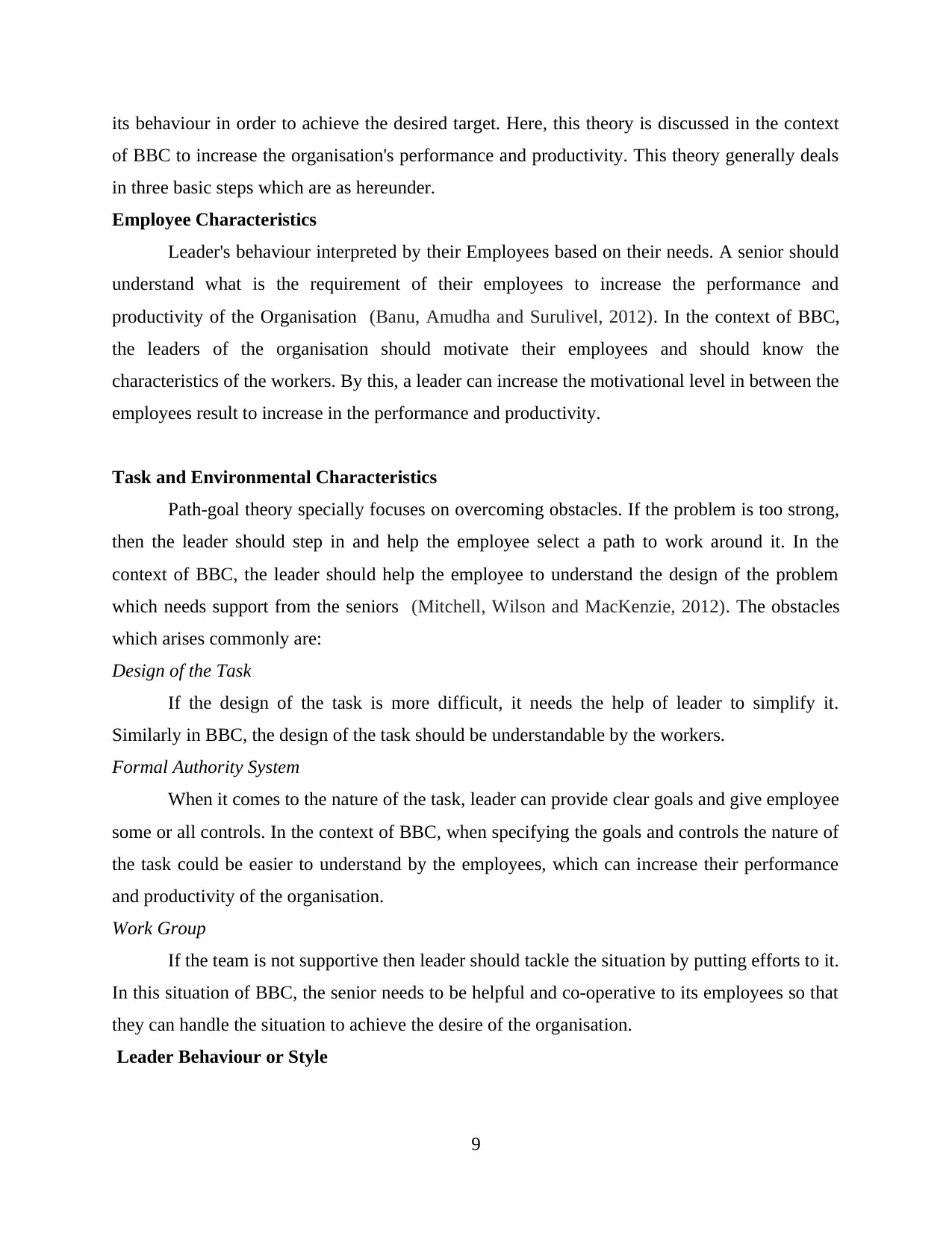
its behaviour in order to achieve the desired target. Here, this theory is discussed in the context
of BBC to increase the organisation's performance and productivity. This theory generally deals
in three basic steps which are as hereunder.
Employee Characteristics
Leader's behaviour interpreted by their Employees based on their needs. A senior should
understand what is the requirement of their employees to increase the performance and
productivity of the Organisation (Banu, Amudha and Surulivel, 2012). In the context of BBC,
the leaders of the organisation should motivate their employees and should know the
characteristics of the workers. By this, a leader can increase the motivational level in between the
employees result to increase in the performance and productivity.
Task and Environmental Characteristics
Path-goal theory specially focuses on overcoming obstacles. If the problem is too strong,
then the leader should step in and help the employee select a path to work around it. In the
context of BBC, the leader should help the employee to understand the design of the problem
which needs support from the seniors (Mitchell, Wilson and MacKenzie, 2012). The obstacles
which arises commonly are:
Design of the Task
If the design of the task is more difficult, it needs the help of leader to simplify it.
Similarly in BBC, the design of the task should be understandable by the workers.
Formal Authority System
When it comes to the nature of the task, leader can provide clear goals and give employee
some or all controls. In the context of BBC, when specifying the goals and controls the nature of
the task could be easier to understand by the employees, which can increase their performance
and productivity of the organisation.
Work Group
If the team is not supportive then leader should tackle the situation by putting efforts to it.
In this situation of BBC, the senior needs to be helpful and co-operative to its employees so that
they can handle the situation to achieve the desire of the organisation.
Leader Behaviour or Style
9
of BBC to increase the organisation's performance and productivity. This theory generally deals
in three basic steps which are as hereunder.
Employee Characteristics
Leader's behaviour interpreted by their Employees based on their needs. A senior should
understand what is the requirement of their employees to increase the performance and
productivity of the Organisation (Banu, Amudha and Surulivel, 2012). In the context of BBC,
the leaders of the organisation should motivate their employees and should know the
characteristics of the workers. By this, a leader can increase the motivational level in between the
employees result to increase in the performance and productivity.
Task and Environmental Characteristics
Path-goal theory specially focuses on overcoming obstacles. If the problem is too strong,
then the leader should step in and help the employee select a path to work around it. In the
context of BBC, the leader should help the employee to understand the design of the problem
which needs support from the seniors (Mitchell, Wilson and MacKenzie, 2012). The obstacles
which arises commonly are:
Design of the Task
If the design of the task is more difficult, it needs the help of leader to simplify it.
Similarly in BBC, the design of the task should be understandable by the workers.
Formal Authority System
When it comes to the nature of the task, leader can provide clear goals and give employee
some or all controls. In the context of BBC, when specifying the goals and controls the nature of
the task could be easier to understand by the employees, which can increase their performance
and productivity of the organisation.
Work Group
If the team is not supportive then leader should tackle the situation by putting efforts to it.
In this situation of BBC, the senior needs to be helpful and co-operative to its employees so that
they can handle the situation to achieve the desire of the organisation.
Leader Behaviour or Style
9
⊘ This is a preview!⊘
Do you want full access?
Subscribe today to unlock all pages.

Trusted by 1+ million students worldwide
1 out of 17
Related Documents
Your All-in-One AI-Powered Toolkit for Academic Success.
+13062052269
info@desklib.com
Available 24*7 on WhatsApp / Email
![[object Object]](/_next/static/media/star-bottom.7253800d.svg)
Unlock your academic potential
Copyright © 2020–2026 A2Z Services. All Rights Reserved. Developed and managed by ZUCOL.





